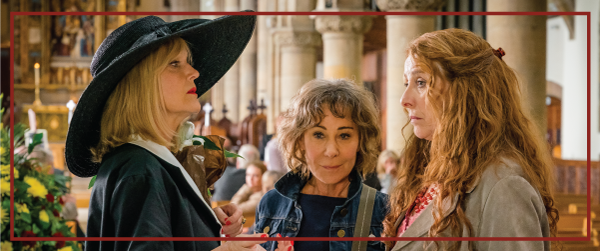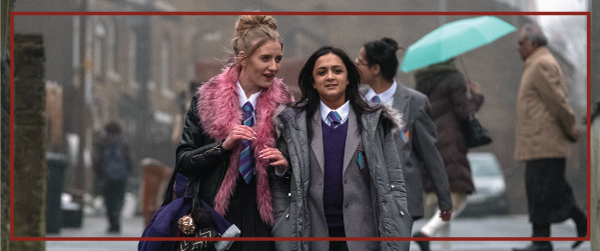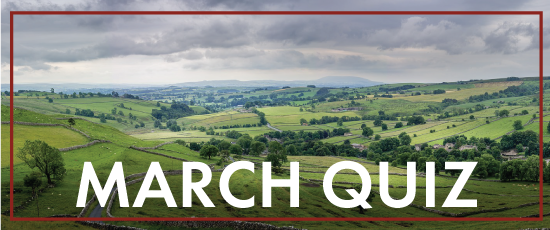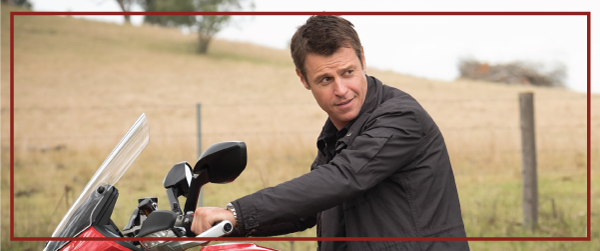
Welcome to the first issue of The Acorn TV Dispatch.
This monthly newsletter will take you behind the scenes of your Acorn TV favorites and give you an exclusive look at upcoming series and shows. You can also stay current on the newest and most popular offerings on Facebook, Twitter, and Instagram.
In this issue, you’ll hear from the stars of the Acorn TV Original Girlfriends and, as context for the drama Ackley Bridge, learn more about the South Asian community in Britain. You’ll also be able to take a quiz about the county where these two new series take place (Yorkshire), get an insight on Cockney rhyming slang, and more.
Thank you for being a part of our growing Acorn TV community. Enjoy the newsletter – and happy streaming!
In this issue:
- Inside the New “Mellor Drama,” Girlfriends
- Big Changes at Ackley Bridge
- Know Your Yorkshire? Quiz
- No Rhyme or Reason? Understanding Cockney
- Q&A with Rodger Corser on 3/5
- Ask Acorn TV
Sign up to receive The Acorn TV Dispatch via email:
Inside the New “Mellor Drama,” Girlfriends
Three best friends trying their best to get through life

BAFTA Award–winning writer Kay Mellor knows just how to ratchet up the drama. She’s had good practice. In Love, Lies & Records, she introduced us to a city registrar struggling to balance the drama of her personal life with the stresses of dealing with the life events – births, deaths, and marriages – of others. In Girlfriends, Mellor brings together Linda, Sue, and Gail (Phyllis Logan, Miranda Richardson, and Zoë Wanamaker) and raises the drama by the power of three.
We recently caught up with the Girlfriends cast. Here’s what they had to say about the new Acorn TV Original series.
Girlfriends, Honorary and Otherwise
When we ask our three guests why Girlfriends is so special, an animated Phyllis Logan immediately cites two reasons. First, she gestures toward the woman seated beside her and exclaims in her soft Scottish burr, “It’s starring the delicious Miranda Richardson.” And second, she points to her other colleague – then recoils in mock horror that it’s not Zoë Wanamaker but Matthew Lewis, who plays Tom, the ne’er-do-well son of Wanamaker’s character.
“Zoë couldn’t be here,” explains Logan (The Good Karma Hospital, Downton Abbey) about her missing co-star. “Unlike the rest of us, she’s got a job…She’s in the theatre.”
Richardson (And Then There Were None) puts an arm around Lewis. “You’re an honorary girlfriend,” she reassures him.
Logan likes her own Girlfriends character, Linda. She enjoys her “hippy, dippy” style – platform shoes, “floaty” clothes, and flowing “Pre-Raphaelite” locks, which Logan reveals were made possible by the use of hair extensions. The chance to trade a corset for Spanx was also a welcome change for the Downton star.
As Logan explains, it is the challenges Linda faces that bring the three lifelong friends back together. But each has challenges of her own. Richardson’s “adrenaline-addicted” character, Sue, has single-mindedly pursued a career. “But is she happy?” asks Richardson rhetorically. In the first episode, the two-time Oscar® nominee explains, Sue loses everything she’s worked for. And who comes to her rescue in the midst of her problems? Her girlfriends.
Son Tom is Gail’s problem – or one of them. “A child masquerading as a man” is how Lewis describes him. He’s someone millennials like Lewis can relate to. “At 24, I can’t do half the things my dad would have been able to do at my age,” he admits. “I don’t know how to bleed a radiator. I don’t know how to fix a car…But we live in a time of comfort and convenience. So people are allowed to be mentally younger a lot older now. Tom is one of those people.”
“And your mother is an enabler!” Logan interjects, referring to Wanamaker’s character, who dotes on Tom and mollycoddles him. Lewis agrees: “Because of that, he’s never had to grow up, never had to mature.” But on a more hopeful note, he adds: Tom’s “got a good heart – he’s a good person. He just needs to grow up and stop walking all over his mother.”
All three are big fans of series writer-director Kay Mellor (who calls Girlfriends her “passion project”) and her focus on “women of a certain age.” Says Richardson of that demographic group, “We’re all living longer, and we’re all experiencing the things that the characters are experiencing – attendant issues from being on the planet longer and who you might have to look after and all those layers of living.”
The “girlfriends” also acknowledge the importance of long-standing friendships in their private lives and away from the camera. “It’s always great to have someone you’ve got a ‘shorthand’ with,” says Logan. “You know each other, your foibles; you’ve been through so much together…I still have several friends from when I started out – 120 years ago!”
Richardson acknowledges the challenges of being in such an “itinerant” profession, one with “very intense relationships for a very short time.” She confides, “So the people you trust are the ones that you’ve known for the longest,” the ones who can provide what you need to stay grounded. As she puts it, “You want to hear what’s really going on in the world instead of this crazy make-believe.”
But that’s for later. For the moment, what’s really going on in the world can take second place. Right now, we’ll gladly indulge the “crazy make-believe” – and all the wit, drama, and charm that Girlfriends has to offer.
Finally, a word from Girlfriends writer and director Kay Mellor:
“…A lot of women of a certain age [feel] invisible and unheard, so I’m proud to have the chance to shine a light on their lives and give them a voice. The series is not just a platform for their voices, though – there is a big, bold, dark story at its heart, which is shot through with humor. I’m hoping both men and women will love it as much as I’ve loved writing it.”
Big Changes at Ackley Bridge
When integration comes to a small West Yorkshire mill town

In the mid-1950s, just as Brown v. Board of Education began to change the makeup of American schools, Britain was embarking on a new stage in its own unique history of multiculturalism and racial integration. For the first time, large numbers of immigrants from the Indian subcontinent were arriving in the country. The face of Britain was about to change.
Fast-forward 60 years to one small corner of the North of England and a new high school designed to bring together two separate communities – one white, one Asian. That’s the setting for the new drama Ackley Bridge.
Big Changes in Britain
In the UK, “Asian” usually refers to people of South Asian origin. Those who came to Britain during the 1950s were not the first such immigrants from the Indian Subcontinent. Asians seeking employment as domestic workers or in the British military had been coming to the country since the 18th century. But the numbers involved were small, and only after World War II did large-scale immigration begin.
In 1877, Queen Victoria became Empress of India. A source of spices, cotton, silk, and (most important of all?) tea, India was considered the “Jewel in the Crown” of the empire. The British called it the Raj.
When imperial rule ended in 1947, this vast territory was partitioned into two sovereign countries: India (which was mostly Hindu) and Pakistan (which was mostly Muslim). Eventually, East Pakistan broke away to form its own independent country of Bangladesh. Off the southern tip of India another British possession, the island of Ceylon (since 1972 known as Sri Lanka and with a majority Buddhist population) also gained its independence.
Many of the Asian immigrants who began arriving in postwar Britain came to work in the country’s steel mills and factories. Big cities like London were a destination for many (and in 2016 a Briton of Pakistani origin was elected the city’s mayor). But so were small towns in distant Yorkshire, where cloth caps and meat pies coexisted alongside saris and samosas. Cosmopolitanism had arrived in the cold North of England.
Cuisine is perhaps the most visible South Asian contribution to UK society and way of life. “Going out for a curry” or “for an Indian” became as common a Friday night tradition as heading to the pub. Fish and chips now had a rival in the fare offered by new Indian restaurants (most of which are actually owned by Bangladeshis). Indeed, in 2001 the UK’s foreign secretary declared chicken tikka masala “a true British national dish” – their version of what Americans call the melting pot. As he put it:
“…it is a perfect illustration of the way Britain absorbs and adapts external influences. Chicken tikka is an Indian dish. The masala sauce was added to satisfy the desire of British people to have their meat served in gravy.”
How external influences are “absorbed and adapted” has varied from place to place across the British Isles. Just how one small Yorkshire town does it is the subject of Ackley Bridge.
Want integration on a smaller scale? Watch The Indian Doctor.
Know Your Yorkshire?
Take the quiz to test your knowledge!

You might already know that Yorkshire is England’s biggest county. And that it’s the setting for Acorn TV’s Ackley Bridge, Girlfriends, and Love, Lies & Records. Take our Yorkshire quiz to see what else you know about the place that locals call “God’s own county.” (There’s a couple of Acorn TV–related questions to get you started.) But no cheating – googling your answers just wouldn’t be cricket.
No Rhyme or Reason?
Understanding Cockney
Though its exact origins are unclear, Cockney rhyming slang may have initially been used by market traders in London’s East End to disguise what they were saying from customers. According to another story, it was criminals who developed this peculiar form of communication so the police wouldn’t understand what they were saying. Today, Cockney rhyming slang is widely understood throughout Britain and a part of the popular culture.
It often (though not always!) works like this…
First, an expression or group of words is chosen that rhymes with the word to be disguised. For example, “a butcher’s hook” is used instead of “look.” But the rhyming word (“hook”) is then dropped, leaving just the non-rhyme (“butcher’s”). So, if a Cockney is having “a butcher’s,” he is having a look.
With this in mind, it becomes slightly more understandable why the Cockney for “feet” might be “plates” (short for “plates of meat”). Or why your head is your “loaf” (“loaf of bread”) or your house is your “Mickey” (“Mickey Mouse”).
The efforts of 19th-century criminals or market traders notwithstanding, when Inspector George Gently transfers from the London Metropolitan Police to the Northeast of England, he evidently brings a little of the Cockney with him. In the episode “Goodbye China,” Gently investigates the death of an old friend he calls “China.” In rhyming slang, “my old China” is short for “my old China plate” – and “China plate” rhymes with “mate” (i.e., friend).
Q&A with Rodger Corser

Rodger Corser, star of smash-hit Aussie dramedy The Heart Guy, will be taking over the Acorn TV Instagram story on March 5 to answer questions from fans. Be sure to follow us on Instagram before then to watch.

Will the new season of Striking Out be made available episodically or all at once?
Ready, set, binge! The all-new season of award-winning Acorn TV Original Striking Out will premiere at once on March 16 – and there are even more episodes to enjoy in this new season.
There’s plenty more to look forward to in 2018, including the highly anticipated return of some Acorn TV fan favorites. We will announce dates as they are confirmed. Queue up your watchlist for these 2018 premieres:
Delicious, Series 2 premieres March 5
The Good Karma Hospital, Series 2 will premiere April 2
Midsomer Murders, Series 20 will premiere in 2018
Agatha Raisin, Series 2 will premiere in 2018
Jack Irish, Series 2 will premiere in 2018
Line of Duty, Series 4 will premiere in 2018
Have a question for Acorn TV?
Let us know on Facebook, Twitter, or Instagram.
